You know that feeling when your hair just shines with health? It’s soft, manageable, and full of life. We all want that, right? But sometimes, it feels like a struggle. Well, guess what? Nature has our back (and our scalp)! 🌿 More and more people are realizing that harsh chemicals aren’t the answer to our hair woes. Instead, they’re turning to the power of plants for a more natural hair care approach. And it totally makes sense! For centuries, different cultures have relied on herbs and plants to keep their hair looking its best. Let’s dive into the world of natural hair care and discover how we can unlock the secrets to naturally gorgeous hair.
First Things First: Getting to Know Your Hair
Before we start whipping up DIY hair masks, it’s important to understand what makes our hair tick. Just like our skin, everyone’s hair is unique. Knowing your hair type and hair porosity can help you choose the right botanical ingredients to address your specific hair needs.
- Hair Types: Think of hair types as categories like straight, wavy, curly, or coily. And then there’s texture: fine, medium, or thick. Understanding your hair type helps you pick products that work with your natural texture, not against it.
- Hair Porosity: This refers to your hair’s ability to absorb and retain moisture. It can be low, medium, or high. You can actually test your hair’s porosity with a simple float test (you can find instructions online). Knowing your porosity level helps you figure out which oils and products will penetrate your hair best.
Feed Your Follicles: Nutrients for Healthy Hair Growth
We all know that a healthy diet is important for our overall well-being, but did you know that it also plays a huge role in hair health? Just like our bodies need the right nutrients to function properly, so does our hair! Let’s look at some of the key vitamins, minerals, and other superstars that contribute to strong, shiny, and healthy hair:
- Biotin (Vitamin B7): This is like the holy grail of hair vitamins! Biotin is essential for producing keratin, the protein that gives our hair its strength and structure. Not enough biotin? You might experience hair loss or thinning. Load up on biotin-rich foods like nuts, eggs, and sweet potatoes.
- Vitamin E: A powerful antioxidant that protects our hair from damage caused by pollution, UV rays, and all those other environmental nasties. Vitamin E also improves blood circulation in the scalp, which means more nutrients are delivered to those hair follicles! You can find vitamin E in nuts, avocados, and spinach.
- Vitamin C: This vitamin is a collagen booster, which is super important for strong and healthy hair strands. It also helps our bodies absorb iron, a mineral that’s essential for preventing hair loss. Get your vitamin C fix from berries, citrus fruits, and leafy greens.
- Vitamin A: Keeps your scalp happy and hydrated by promoting sebum production. It also supports cell growth, which is important for healthy hair growth. Sweet potatoes, carrots, and spinach are great sources of vitamin A.
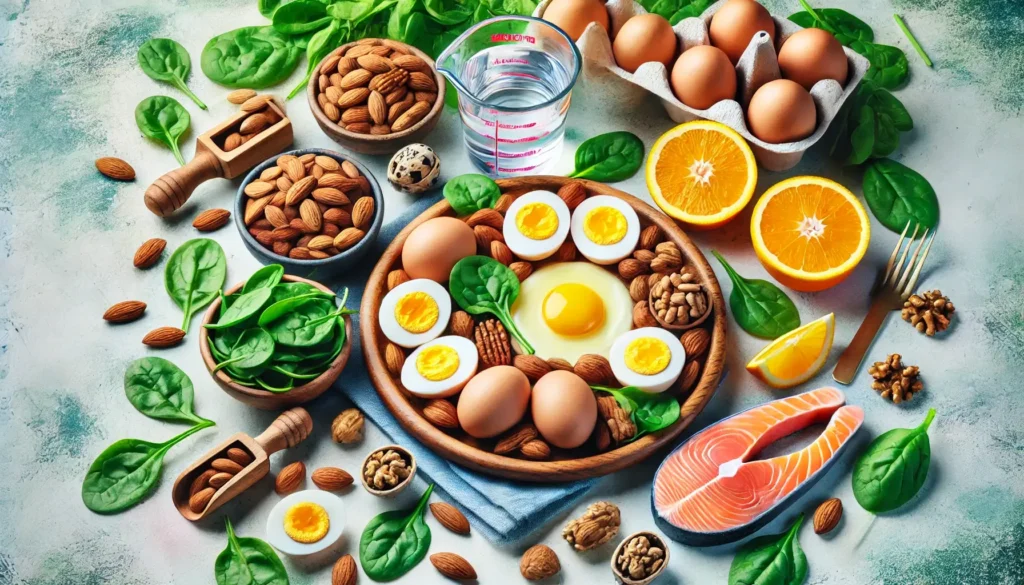
- Vitamin D: This sunshine vitamin plays a crucial role in hair follicle health and growth. Soak up some sun (safely!) and include foods like fatty fish and egg yolks in your diet to boost your vitamin D levels.
- Iron: Think of iron as the delivery system for oxygen to your hair follicles. Not enough iron? Your hair might start thinning. Pump up your iron intake with spinach, beans, and lean poultry.
- Zinc: This mineral is a repair superhero, helping to grow and repair hair tissue. It also keeps the oil glands around your hair follicles working properly. Oysters, pumpkin seeds, and beans are all good sources of zinc.
- Protein: Remember those building blocks we talked about? Protein is like the foundation for healthy hair! It’s essential for hair growth and repair. Make sure you’re getting enough protein from sources like eggs, lean poultry, beans, and nuts.
- Omega-3 fatty acids: These healthy fats nourish your hair from the inside out and help to keep your scalp in tip-top shape. Salmon, walnuts, and flaxseeds are excellent sources of omega-3s.
Nature’s Hair Heroes: Natural Hair Care Treatments for Happy Hair
Now, let’s talk about the fun stuff: topical treatments! There are so many amazing botanical ingredients that can work wonders for your hair. Here are a few superstars:
- Amla (Indian Gooseberry): This little fruit is a powerhouse of vitamin C and antioxidants. It strengthens hair follicles, prevents those pesky gray hairs from popping up too soon, and gives your hair a gorgeous, natural shine.
- Bhringraj: This herb has been used in Ayurveda for ages to promote hair growth and fight hair loss.
- Hibiscus: Say hello to shiny, healthy hair! Hibiscus is packed with vitamins and amino acids that nourish your hair, prevent breakage, and keep your scalp healthy.
- Neem: Struggling with dandruff or scalp infections? Neem to the rescue! This herb has antibacterial and antifungal properties that help to keep your scalp clean and healthy.
- Rosemary: Want thicker, fuller hair? Rosemary stimulates blood circulation in the scalp, which can help to promote hair growth. Plus, it smells amazing!
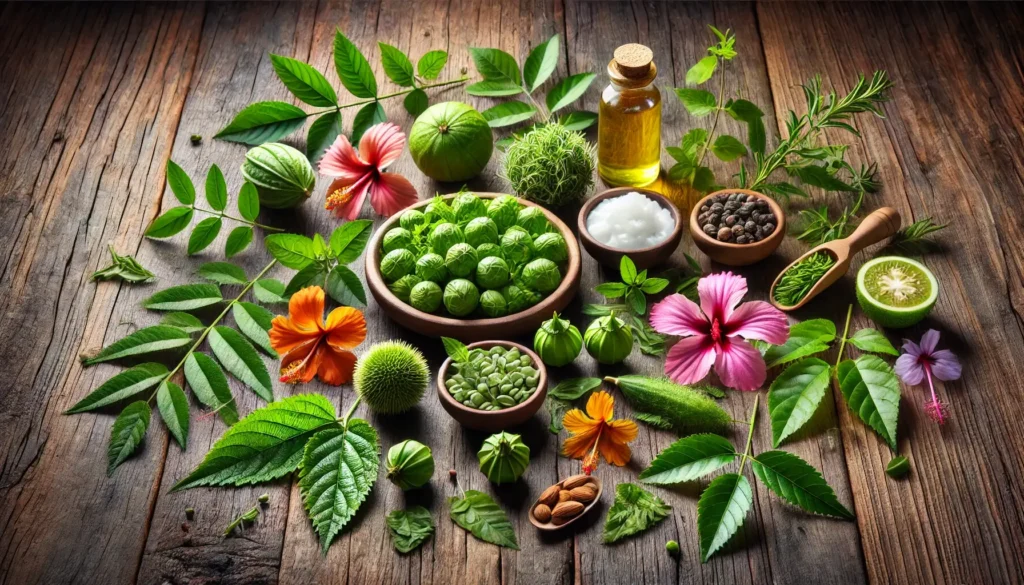
To get the most out of these botanical ingredients, you can use them with carrier oils. Carrier oils help to dilute essential oils and make them easier to apply to your scalp. Some popular carrier oils include:
- Coconut oil: A great all-around oil that’s especially beneficial for dry or coarse hair.
- Almond oil: Rich in vitamins and minerals, almond oil is a lightweight option that works well for most hair types.
- Jojoba oil: This oil is similar to the sebum that our scalp naturally produces, making it a great choice for balancing oil production, especially for those with fine hair.
Addressing Your Hair Concerns: Nature’s Got You Covered
Let’s get specific and talk about how botanical ingredients can help with common hair concerns:
- Hair loss and thinning: Hair loss can be caused by a variety of factors, including genetics, hormonal changes, stress, and even nutritional deficiencies. Botanical ingredients like bhringraj, hibiscus, and rosemary can help to promote hair growth and strengthen hair follicles. Don’t forget to manage stress levels and eat a balanced diet!
- Dandruff and scalp irritation: A flaky, itchy scalp can be super annoying. Neem, tea tree oil, and aloe vera can be your best friends here. They have antifungal, antibacterial, and soothing properties that can help to calm and heal your scalp.
- Dryness and breakage: If your hair feels like straw, it’s time to show it some love! Coconut oil, almond oil, and amla can help to moisturize your hair and scalp, prevent protein loss, and strengthen those strands.
Hair Care Rituals from Around the World
For centuries, people have used natural ingredients to take care of their hair. Different cultures have their own unique traditions and rituals, and it’s fascinating to see how they’ve harnessed the power of nature for healthy hair:
- Ayurveda: In India, Ayurveda has been practiced for thousands of years. Ayurvedic hair care focuses on using herbs and oils to balance the body and promote hair health. Some popular Ayurvedic ingredients include bhringraj oil, amla, and brahmi.
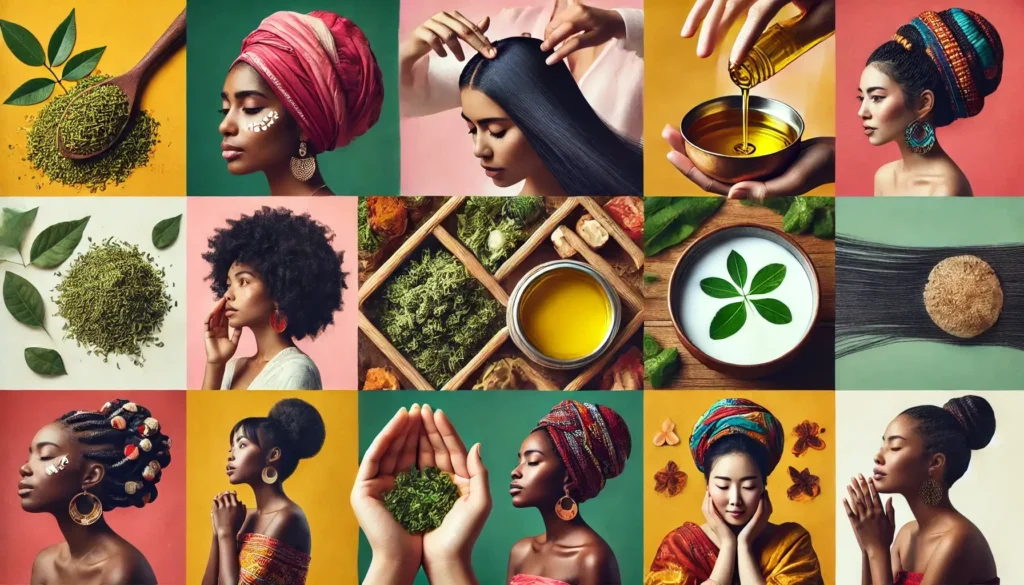
- Other cultural traditions: You can find amazing hair care practices all over the world! African cultures have used natural oils and butters for generations to moisturize and style their hair. In Asia, herbal hair rinses with ingredients like green tea and rice water are common. And many indigenous cultures have relied on native plants for centuries to cleanse and condition their hair.
Your Holistic Hair Care Journey
Ready to embrace the power of botanical hair care? Here are a few tips to get you started:
- Read product labels: When you’re shopping for hair care products, take a minute to read the label. Look for products that contain botanical extracts and avoid those with harsh chemicals.
- Choose the right products: Not all hair products are created equal! Think about your hair type, porosity, scalp condition, and specific hair concerns when choosing products.
- Create a natural hair care routine: This might include using a gentle, sulfate-free shampoo, a moisturizing conditioner, a weekly hair mask, and a leave-in conditioner or hair oil.
Hair Care = Self-Care
Taking care of our hair isn’t just about looking good. It’s about feeling good, too! Here are a few ways to make hair care a more holistic and mindful experience:
- Stress management: Did you know that stress can actually contribute to hair loss? Find healthy ways to manage stress, like yoga, meditation, or spending time in nature.
- Scalp massages: A scalp massage not only feels amazing, but it can also improve blood circulation to your scalp and help you relax. Use a botanical oil like rosemary or lavender to make your massage extra special.
- Mindful hair care: Instead of rushing through your hair care routine, try to be present and enjoy the process. Appreciate the natural beauty of your hair and treat it with kindness.
Embrace the Natural Beauty of Your Hair!
Well, there you have it! We’ve explored the amazing world of botanical hair care, from understanding our hair type and nourishing it from within to using nature’s finest ingredients to address our specific hair concerns. Remember, healthy hair is a journey, not a destination. Be patient, be consistent, and most importantly, have fun experimenting with different botanical ingredients and practices to find what works best for you. Embrace your natural beauty and let your hair shine! ✨
If you’ve read this far, we can guess that you’re interested to learn more on what we just discussed. If that’s the case, read this. The way you are conscious about your hair, that should be the same for your skin too. If you want to know which natural ingredients to go for your skin care, you can read this article of ours.
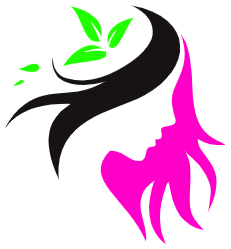
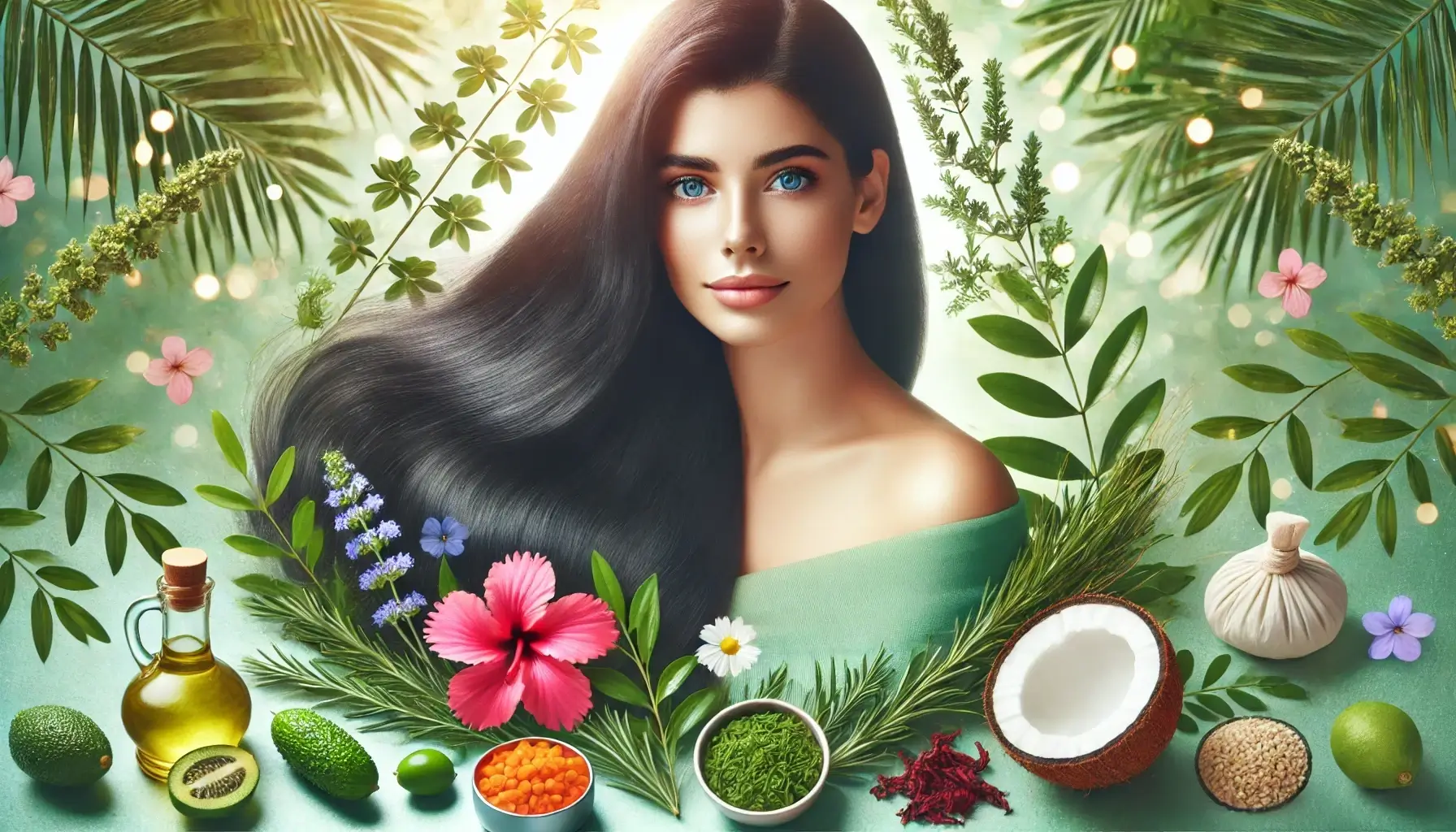
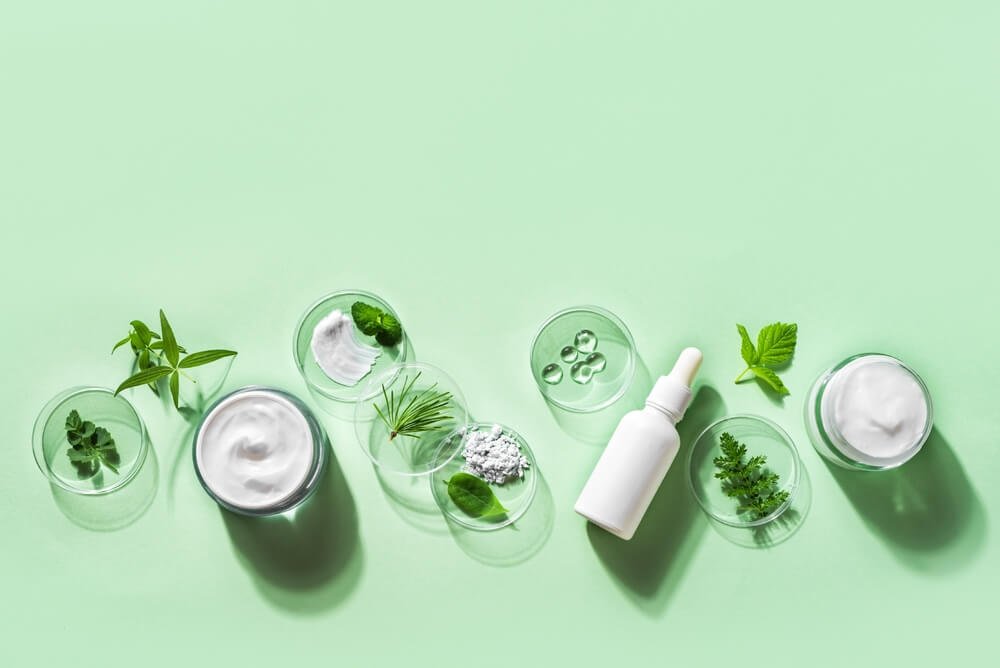

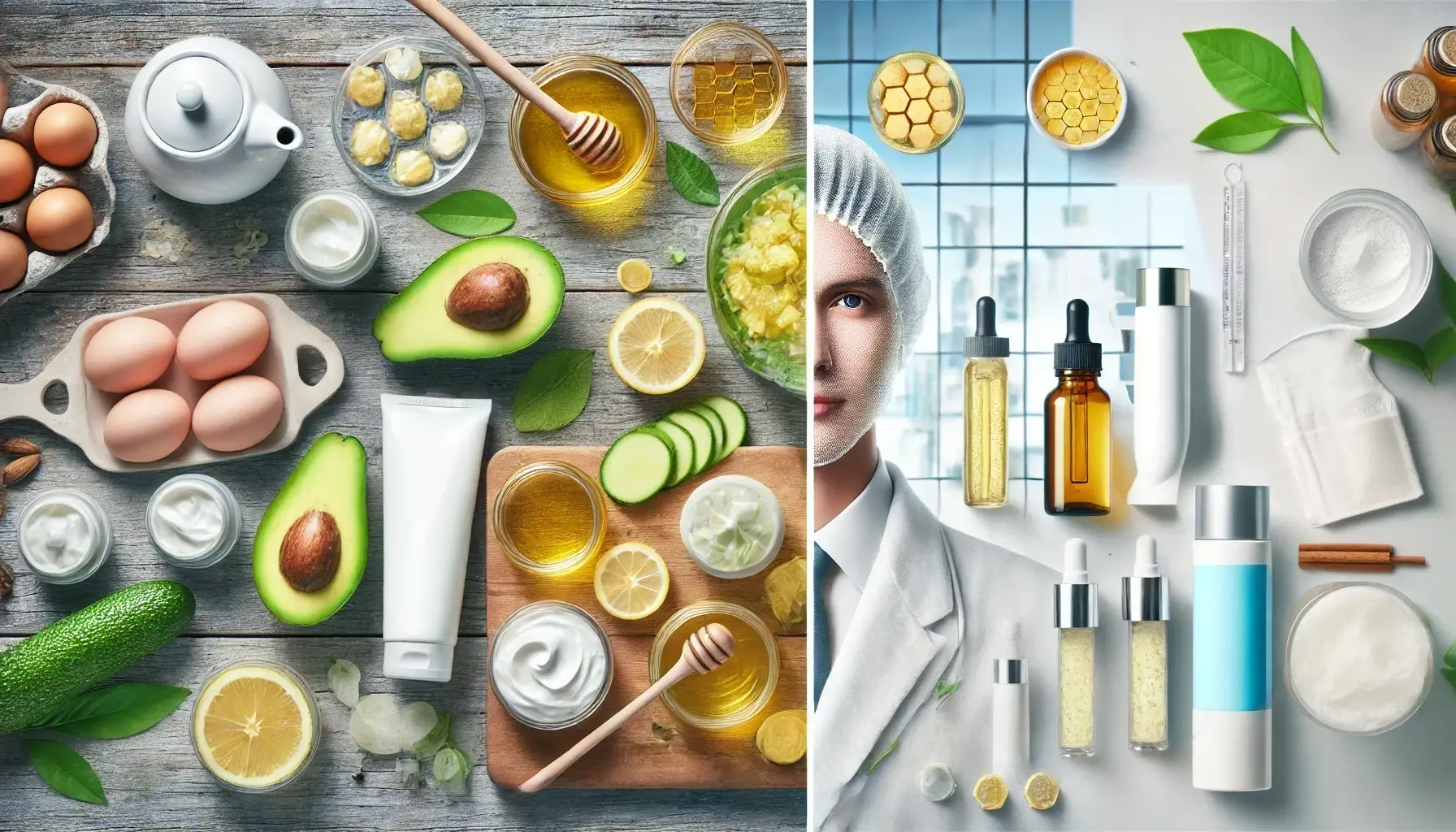
Leave a Reply